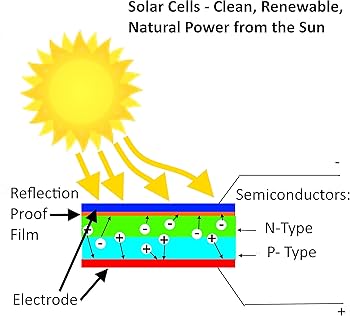
A solar PV cell is the basic building block of a photovoltaic system. Made from semiconductor materials, it absorbs sunlight and generates electricity through the “photoelectric effect” at specific wavelengths. While it can produce electricity on cloudy days, its efficiency is highest on clear, sunny days.
A single PV cell generates a small amount of electricity. To produce more power, multiple cells are connected to form a Solar PV module, which can generate 545W or more, depending on the design. Several PV modules are then connected in an array to produce even greater amounts of energy.



Rooftop solar is a small-scale power plant installed on the roof of a building. It converts solar energy into electricity to meet the building’s power needs, and any surplus energy generated can be fed back into the grid. Rooftop solar systems range from residential to commercial and industrial installations.
The size and capacity of the system depend on factors such as available space, electricity consumption, and the owner’s investment capacity. For example, a 1 kW rooftop solar system can generate around 4.5 units of electricity on a sunny day, which is enough to power 2-3 fans, 6-7 tube lights, and other small appliances for about 4-5 hours.
Maximizing the potential of roof surfaces by utilizing them for efficient solar energy generation.
Achieving zero energy generation costs by harnessing the abundant and renewable energy of the Sun.
Ensuring eco-friendliness by eliminating major pollutants, such as noise, air, and water pollution, as well as any waste byproducts.
Offering a significant return on investment, making solar solutions viable for all types of customers.
Reducing transmission and distribution losses by leveraging the distribution network as a storage source through net metering, enabling co-located generation and consumption.
Enhancing grid performance by improving end-to-end voltage and reducing system congestion.
Effectively managing critical peak loads through advanced distribution management systems.
Strengthening system reliability by enabling solar energy to feed the grid during blackouts or voltage dips.
Contributing to a reduction in the global carbon footprint, making solar energy a sustainable and mutually beneficial choice for everyone.
With the Government of India’s fixed solar tariff at ₹2.20/kWh for 25 years, switching to solar is more affordable than ever. Installation costs have also dropped significantly over the last decade.
A solar rooftop system generates electricity for up to 25 years. Even if it doesn’t fully cover your energy consumption, it will still substantially lower your utility bills, saving you money in the long run.
Solar technology is now seen as a modern, eco-friendly lifestyle choice, enhancing your property’s value and appeal.
Residential users can expect a return on investment (ROI) of 25% to 40%, making solar a financially rewarding decision.
Solar systems are nearly maintenance-free and don’t require any fuel, ensuring hassle-free performance year after year.
The installation process is straightforward, with simple component interconnections, making it a convenient choice for homeowners.
The Ministry of New and Renewable Energy (MNRE) offers a 30% subsidy for domestic installations and non-profit organizations, reducing upfront costs significantly.
Solar power reduces the need for fossil fuels, helping lower carbon emissions and combat climate change.
Solar rooftop systems provide a reliable energy source in remote locations where grid electricity is challenging to access.
There are two methods in which an ON-grid Rooftop system can be designed:
WhatsApp us